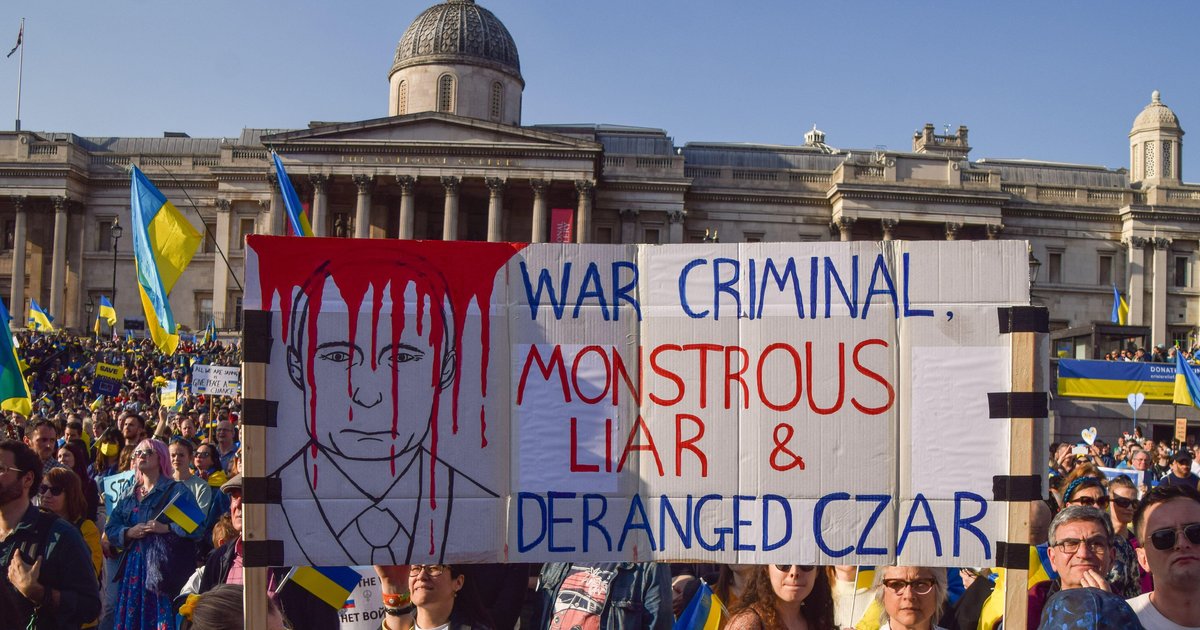Down with the modern tsarism of Vladimir Putin! A response to Yanis Varoufakis
It is not new to say that we live in an ultra-capitalist world: a world initiated and then supervised by Washington, when the collapse of the Soviet Union gave it victory in the Cold War and a unique primacy after 1992. He built a world system and crushed the 20th century left.
Today, however, and largely thanks to American recklessness, it is a system in “polycrisis”. Its failures have been spectacular: military, in Iraq and Afghanistan; financial, with the great crash of 2008; economic, in terms of the well-being of the American working and middle classes; environmental, as the planet burns, and ideological, with the unraveling of its neoliberal claim that “the market knows best”.
Added to this are two failures of the United States’ post-1992 global strategy. One is the greatest human achievement of the time – the transformation of China out of poverty, which created an economic and strategic competitor that was not subordinate to Wall Street. The second is how the United States colluded with the oligarchs generated by the failures of communism, to plunder and ruin Russia rather than create an ally.
The human costs of US policy toward Russia have just been brought back to life by Adam Curtis. Political humiliation led to Vladimir Putin, who became a monstrous expression of oligarch capitalism.
Donald Trump’s policies can be seen as an effort to pre-empt the threat of domestic revolt against America’s military and economic failure by exploiting growing disillusionment and discontent, while replacing the complacency of his globalist elite with a nationalist mobilization, especially against China. . It is also part of an international shift to a mafia-style world with strongmen in China, India, Russia, Turkey, Egypt and elsewhere.
This begs a question: why didn’t the far right just brush the board? Given its strategic coherence, deep funding, well-organized populism, evangelical support, appeal of misconceptions about racial or religious supremacy, weakness of the liberal center, marginalization of socialism and the fatalism generated by decades of “capitalist realism” telling people that voting can’t change things – how come the far right doesn’t triumph everywhere?
Instead, his success is on the razor’s edge. The recent elections in Brazil are a clear example, with Lula winning the presidency by less than 2% even as Bolsonaro’s allies are victorious in all regions, including São Paolo. The results of midterm reviews in the United States are another and express a process that I have described in a brief openDemocracy documentary earlier this year.
My explanation for the extraordinary balance of forces is that under the massive, continuing, and incoming tide of commodification, countercurrents have been energized, including feminism, anti-racism, environmentalism, and egalitarian notions of human rights. the man. These generate a new form of humanization, reinforced by means that I briefly exposed in my book Take control! through medical science, body health awareness and digital interconnection, which are changing how we think about our bodies and ourselves as a species and how we relate to our planet. Together they have led to a multifaceted and argumentative resistance to extreme capitalism – but not yet to a political alternative.
Resistance forces, often but not always on the left, were not sparked by socialist movements or Marxist analysis. They do not have the organizational weight of the class struggle, but they ensure that the younger generations have a totalizing ecological consciousness rather than a sectional and self-interested consciousness.
I started to develop this argument during the pandemic lockdown and was invited by Yanis Varoufakis to join him and the late Rosemary Bechler on DiEM25 TV to talk about it. Varoufakis was surprised that someone who helped launch DiEM25 didn’t see ‘socialism’ as the source of democracy, and at first thought I was ‘teasing’ him.
One thing none of us expected was that such an analysis would soon be put to the test of war. Is it fair to say that the huge wave of solidarity with Ukraine expresses the strength of the new humanization? Or that Putin’s brutal deployment expresses the determination of Trump’s contempt for humanity as well as legality?
On the razor wire
Ukraine is a harsh confirmation of the “cutting edge” nature of the post-Covid world. But it is far from being a simple confrontation between progress and reaction. With US, EU and UK support for Ukraine comes a desire to integrate its wealth and ensure its democratic spirit is tamed.
The paradox is captured by Account of Adam Tooze of the recent study by the Center for Economic Policy Research report on Ukraine. CEPR supports the successful national patriotic mobilization of Zelenskyi’s government, but advocates using wartime urgency to impose ultra-neoliberal policies aimed at removing state regulation of the economy and even social welfare. It’s already partially underway in the elimination of labor laws that Tom Rowley and Serhiy Guz have documented.
Tooze writes: “Conducting this type of reconstruction under conditions of war when the reach of public debate, strikes and opposition is limited, short-circuits democracy. Since defending democracy is part of Ukraine’s appeal, this is bitterly ironic. It is also a bet. It risks driving wedges in the national solidarity that is, if history is any guide, necessary to sustain war.
The challenge for the institutions of government in the West, often referred to as “the center”, is that to continue a long war, they must rule capitalism directly and abandon the scents of neoliberalism – as economist Joe Stiglitz has put it. argued more … than once. The challenge for all of us who want to extend our solidarity and support to Ukraine is that its battle depends on US military support, which rightly generates enormous ambivalence.


Comments are closed.